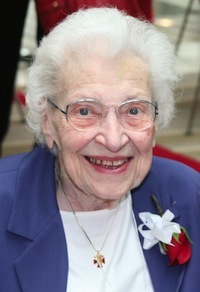Pioneering UW nursing educator Signe Skott Cooper dies at 92
Signe Skott Cooper, who devoted over 60 years of her life to nursing education at UW–Madison and within the UW System, culminating in the naming of the future home of the School of Nursing for her, passed away on July 16, 2013, at Agrace HospiceCare in Madison at the age of 92.

Signe Skott Cooper
“We were deeply honored to be able to name our new building Signe Skott Cooper Hall,” says nursing dean Katharyn May. “Signe was one of the school’s most ardent and dedicated supporters, and her long career in Wisconsin nursing education embodied the essence of the Wisconsin Idea. She was one of nursing’s greatest national resources and helped make the profession what it is today.”
Cooper was born in 1921 in Iowa. Her family moved to Middleton, Wis., in 1937; she graduated from East High School in Madison. She enrolled at the University of Wisconsin School of Nursing (later known as the UW–Madison School of Nursing), and upon licensure as a registered nurse in 1943, enlisted in the Army Nurse Corps and served in the China-Burma-India theatre during World War II.
Upon her return in 1946, Cooper accepted a position at University of Wisconsin Hospital as head nurse on the obstetrical unit, and completed her B.S. degree. In 1948, she was appointed as an instructor at the nursing school and was promoted to assistant professor in 1951. While teaching full-time, she also pursued graduate education at Teachers College and later at the University of Minnesota, earning a master’s degree in education.
In 1955, Cooper joined the faculty of the Extension Division (later known as UW-Extension) and held a joint appointment in the School of Nursing. For two years, she was the only nurse faculty member in extension — a “one-woman department,” developing and offering credit courses in ward management and teaching for nurses across Wisconsin.

Artist’s rendering of Signe Skott Cooper Hall, which will be the new home of the School of Nursing when it is completed in 2014.
Cooper was involved in a number of innovative programs over the next decade, including the development of extension courses in death and dying and the care of the elderly — areas that were not added to university nursing curricula until years later. In 1966, Cooper developed one of the first distance-delivered courses at Wisconsin, broadcasting lectures from Old Radio Hall on the Madison campus to more than 600 nurses at 24 “listening posts” across the state. The program was later expanded through the Educational Telephone Network to reach all 72 counties and 170 listening posts.
Cooper was a leader in professional nursing throughout her career. She wrote two nursing textbooks and edited three others. In recognition of her leadership, she received numerous awards, including the Pioneer Award from the Adult Education Association, the American Nurses Association Honorary Recognition Award for her leadership in continuing nursing education, and election to the American Academy of Nursing. In 1984, she became the first recipient of the Distinguished Achievement Award from the Nurses’ Alumni Organization at the UW. In 2000, Cooper was inducted into the American Nurses Association’s “Hall of Fame”; in 2003, she was named a “Living Legend” by the American Academy of Nursing.
“Signe was one of the school’s most ardent and dedicated supporters, and her long career in Wisconsin nursing education embodied the essence of the Wisconsin Idea.”
Katharyn May
After her retirement in 1983, Cooper developed a new field of expertise: nursing history. Over the next 15 years, she became the School of Nursing’s resident historian. She began a history of the school, and published more than one hundred brief biographies of nurses. In 1981, Cooper received the President’s Award from the American Association for the History of Nursing for her contributions to the field.
Following the death of her sister Hilda in 2000, Cooper pledged her own estate and that of her sister to the UW Foundation to support the construction of a new facility for the school. Her gift, the largest individual gift received in the school’s campaign, combines with lead gifts from UW Hospital and Clinics, the UW School of Medicine and Public Health, and the Rennebohm Foundation, to total $8.2 million — nearly half of the $17.4 million in private support for the facility.
In her 2006 memoir, Cooper wrote: “I have told Dean Katharyn May that my goal is to live long enough to see the completion of the school’s new home. What a thrill that will be!” Cooper lived to witness the groundbreaking and placement of the top beam for Signe Skott Cooper Hall. “She will be there in memory and spirit for everyone who walks through the building for many years to come,” May says.




